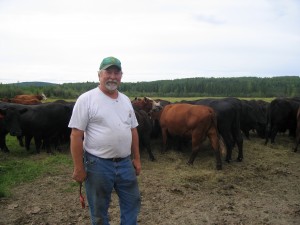Former mechanic wants to engineer healthy beef market
August 3, 2010
907-474-5042
8/3/10

When Fritz Wozniak retired after 30 years as a heavy equipment mechanic he was determined to stay active, so he immediately leaped into farming.
“ I went from 10-hour days to 14 to 18-hour days,” Wozniak said, shaking his head. He loves the turn his life has taken and at 58, he hopes to live to be 100 without spending much time in a recliner.
Farming was already in his blood, as he comes from a third-generation farm family in Nebraska. Until the eighth grade he helped raise cattle, but when his father got a job as postmaster the family moved to town. Wozniak and his brother worked as hired hands on nearby farms all through high school. “We never took a summer off,” Wozniak said.
Then he worked in construction for Coors Brewery in Colorado until the pipeline lured him to Alaska. Upon retirement in Fairbanks four years ago, a friend, Jim Huffman, needed a partner to help with his cattle and Wozniak jumped right in. They have over 200 Black Angus cattle, along with hogs and sheep, off of Chena Hot Springs Road. Their other operation is growing hay, oats and barley near Eielson Farm Road.
Due to increasing consumer interest in natural beef, Wozniak wants to “get a good beef market going here.” While the farm does use some fertilizers to produce grain the animals never receive hormones or antibiotics and they are free to graze in pastures, not confined to feedlots. “We’re as close as you can get to being organic,” Wozniak said.
He also believes in treating the animals respectfully. When Wozniak rolls out hay in the field, the cattle come running; he doesn’t mind being engulfed by cows, calves and even mammoth bulls. “They’re gentle animals,” he said. “We are breeding toward that.” By selecting cows with good temperaments to become mothers, the farmers can develop a gentler herd. “We don’t like the wild ones,” Wozniak said.
“People praise our beef,” he said. The meat is sold at the Tanana Valley Farmers’ Market or customers can buy a half or quarter side of beef directly from the farm. Wozniak likes it on his plate too.
“The meat is really good; I’ll put it up against any grocer store meat. It’s nicely marbled and tender.” Ribeye steaks and prime rib are his favorite cuts. He hasn’t bought meat in a store for years and the family also raises laying hens for eggs, milks their own cows and grows a huge garden. “To have good tasting meals that are fresh is one of the main benefits of what I do,” he said.
Farming suits Wozniak because he gets to be his own boss and work outdoors. “I work at my terms and conditions,” he said.
The downside is fighting the weather. Last year the hay didn’t make because it was too hot and dry and this year there has been so much rain there hasn’t been a good opportunity for harvesting. “The hay crop is always in the hands of the good Lord,” he said.
Another thing Wozniak finds difficult is the rare occasion when a calf dies during birth. “I don’t like that,” he said.
The competitive market is another challenge. “We want to produce affordable beef and keep a steady supply for our clientele.”
Homegrown Agriculture is provided as a public service by the UAF School of Natural Resources and Agricultural Sciences.


